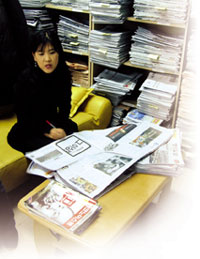 | ||
| ▲ Newsclipper Cho Jin-young (Is. Communication) (Photographed by Kim Young-sung) | ||
Who is a news clipper?
News clippers, as the word shows, clip news and send gathered information to clients. They cover various fields such as finance, politics, sports and fashion. News clipping services are often provided under the PR department, so news clippers have larger image-conscious conglomerates as their clients. Also, sometimes news clippers go so far as to analyze the information and bring out estimates for future. News clippers do more than what their name alone implies.
News clipper's daily life
It is not exaggerating to say that news clippers live along with the news. They start their day trying to cover all the relevant newspapers and magazines. "In Korea, especially in Seoul, about 30~40 major newspapers are issued everyday. Those are what we read and analyze," says Cho Jin-young, a CEO news clipper at Is. Communication. Not only on papers, news clippers fix their eyes but on weekly and monthly magazines, news on TV, and the Internet. Their computers and TVs are 24-hour on.
Hardships of news clippers
To satisfy clients' demand to cover almost all issues in the fastest way, news clippers don't have mornings and nights. "Sometimes we have to make news papers ready for the client as early as 5:30 a.m.," says Cho. What is more, to get the hottest issue of the day, news clippers go for papers just issued at midnight or dawn. To catch issues that just pop out thousand times a day on the internet is never an easy task. "The news clipping service is fairly labor-intensive work," says Kim Kyung-hae, CEO of Korea Comm.
What makes the job fascinating
Despite the hardships, some aspects draw people to this world. Each news clipper works on their own specialties, like finance and sports, and they get related information and news. While they read and analyze articles of their sections, they easily become experts in those fields. "We learn and accumulate knowledge without noticing and it is surprising," says Cho.
"From conglomerate to university, anything or anyone that needs to know information is our client and that makes us do our job. Also, our clients are very satisfied to receive our service," says Cho, explaining news clipping is a job with a bright future. It is also worth noting that the job was announced as a great prospect by the Department of Women in 2004.
 | ||
No courses or qualification are required to be a news clipper. However, to take a course of marketing, advertising, or computing in university is helpful. Also, in some agencies, such as the Korea PR Organization, there are courses related to news clipping. "Much of our job is reading, and scrolling through the Internet, so a calm or patient person would be suitable for this sedentary job," adds Cho.
The job is still in its initial stages and the problem of copyright is left to be solved as news clippers use published articles and news. Nonetheless, the growing importance and value of information in this era and the increasing number of foreign agencies in Korea where the news clipping is generalized need people who can pick out the right piece of data in the midst of the information. Within a few years, the job will be more popular and of more importance. So, Yonseians, be ready for this job. Get a grip on it!

